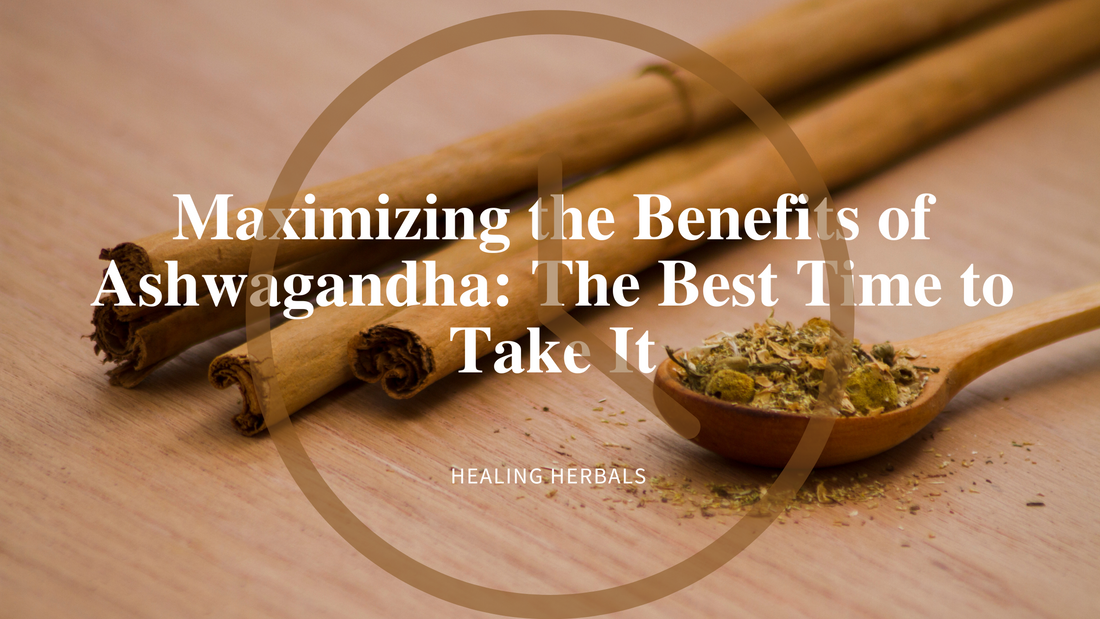
Maximizing the Benefits of Ashwagandha: The Best Time to Take It
Share
Are stress, fatigue, and sleepless nights taking a toll on your well-being? You’re certainly not alone. Ashwagandha, an ancient herb revered for its adaptogenic qualities, is a powerful ally in revitalizing energy, sharpening focus, and improving sleep. But here’s a crucial piece of the puzzle—the when of ashwagandha intake plays a pivotal role in reaping its full benefits. Whether you want to energize your day or calm down into a good night, it's all about the timing when it comes to ashwagandha. Let's explore the best times to take ashwagandha and how matching it up with your needs can unlock its incredible potential.
Traditional Ashwagandha Uses: A Legacy of Benefits
For centuries, ashwagandha has been a popular remedy for increasing stamina, and improving mental acuity, and overall well-being. Traditionally, it has been used to treat stress, anxiety, and fatigue. Its ability to regulate the body's stress response has made it a staple for improving mental clarity and endurance, and thus a place in the pantheon of powerful adaptogens.
How Ashwagandha Affects the Body: A Deeper Look
The Adaptogenic Power of Ashwagandha
Ashwagandha is an adaptogen that regulates the body's stress response, particularly through the modulation of cortisol, which is a hormone associated with stress. The balancing of cortisol supports mental and physical health in that it enables the body to face challenges with resilience.
Reduced Stress and Enhanced Relaxation
Its great ability to calm down the nervous system is perhaps one of the most recognized benefits of ashwagandha. Continuous application helps to reduce body sensitivity to chronic stress and serves as a deep form of relaxation. This makes it especially useful for individuals living with anxiety or those constantly navigating high-pressure environments.
Reviving Energy
In addition to its calming effects, ashwagandha has an energizing side. By balancing cortisol and supporting adrenal function, it provides a sustained, smooth boost in energy—without the crash associated with stimulants. Depending on your goals, the timing of ashwagandha intake can help tailor its effects toward relaxation or revitalization.
The Best Time to Take Ashwagandha: Morning, Evening, or Both?
The best time to consume ashwagandha, therefore, is dependent on your specific needs. For some users, a morning intake could be best; others may want to take this during evening hours, perhaps as an aid to unwind before sleep.
Morning or Early Afternoon: An Energizer for the Day
For anyone looking to fill their day with energy and clarity of thought, ashwagandha may be taken in the morning or early afternoon, when its balancing action on cortisol levels ensures one isn't burned out or overstimulated and offers improvement in focus.
Evening: It's the best sleep aid.
Ashwagandha, taken at night, around 30 to 60 minutes before sleep, may improve sleep quality and alleviate stress during the night. Ashwagandha lowers cortisol levels that are too high to prepare the body for a restful night's sleep.
How Ashwagandha Induces Sleep
Elevated cortisol can ruin sleep, as it disrupts the body's natural circadian rhythms. Ashwagandha tames cortisol production, and this is why it works as a sleep aid. Taking ashwagandha in the evening will make it easier to fall asleep, as the herb complements the body's natural winding-down process.
Ashwagandha for Daytime Energy
Balances the production of energy and its usage, allowing consistent output for extended periods: Ashwagandha's impact on energy doesn't solely lie in fighting fatigue, though that's enough to provide quite a lot. For greater vitality, ashwagandha has a bit less jitters, unlike taking so many cups of caffeine or an amphetamine-type stimulant.
Ashwagandha with Other Herbs/Supplements:
The adaptogenic properties of ashwagandha are amplified when used in a blend with other herbs supporting stress management or enhancing relaxation. Ashwagandha is synergistic with Rhodiola rosea or holy basil for increasing resilience toward stress, while it has the opposite effect with valerian root or lavender to induce relaxation and enhance sleep.
Ashwagandha Dosage: Maximum Effect
Ashwagandha comes in many forms, namely powder, capsules, and tinctures. The powdered form can be mixed in warm milk or water, or one can just pop the pills. But whichever form of ashwagandha is used, consistency has to be practiced so that every benefit is gained.
Getting the Right Dose for Your Goal
Most individuals find success with a daily dosage of 300 to 500 mg, but it’s wise to start on the lower end and gradually increase based on personal response. Ashwagandha supplements vary in potency, so always review product labels for precise guidelines.
Conclusion: Your Personalized Ashwagandha Schedule
Ultimately, the best time to take ashwagandha depends on your personal wellness goals. Whether it is stress relief, increased energy, or improved sleep, the right timing for taking ashwagandha depends on your circadian rhythm. Try both morning and evening dosing and listen to your body for a personal optimal balance that allows for its maximum utilization. Right timing makes ashwagandha a necessity that can be integrated into your daily life to support mental and physical well-being in ways tailored uniquely to your needs.
The Best Time to Take Ashwagandha: A Guide for Powerful Benefits
Description:
Maximize the benefits of ashwagandha by understanding the best times to take it. Whether you seek enhanced energy, reduced stress, or better sleep, the timing of ashwagandha can make a big difference. Learn how to optimize its effects and fit it into your daily routine for maximum results.
Ashwagandha from Healing Herbals:









